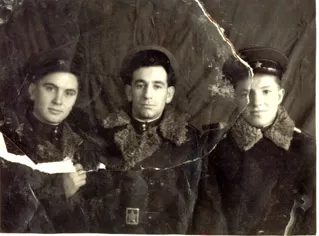It is me Efim Shpielberg (in the center) and my fellow comrades Prianichnikov and Sergeev - both are Russians - during his service in the Soviet army. This photo was taken in Nizhneudinsk in 1949.
I was born in Odessa in 1929. I had a very happy childhood. During the Great Patriotic War my mother and sisters were in Nukha town in Azerbaijan [1,700 km from Odessa]. I got lost on the way there in Novorossiysk. I happened to get to the front. I was responsible for looking after the horses pulling cannons in the battery. When I turned 14 they sent me to a military school in Makhachkala. There I bumped into another man from Moldavanka. He told me that my mother and sisters were in Nukha. I took a freight train to go there immediately. Reunion with my family is one of the happiest events in my life. My mother and sisters were crying and laughing seeing me. They had lost their hope to ever see me again.
In 1944, when our troops liberated Odessa, we returned home. Shortly afterward I entered Odessa military railroad school. There were many Jewish boys studying there and there were Jewish teachers, too. I didn't face any anti-Semitism in the school. I got along well with my schoolmates and we didn't care about national identity of each other. After a year of my studies there the war was over. Victory Day is one of the brightest holidays in my life.
In 1946 after finishing my school I went to work as assistant locomotive operator. In 1949 I was recruited to the army. I served in the Guard airborne division in Nizhneudinsk, Irkutsk region [4,875 km from Odessa]. The nature was beautiful there and in winter the river froze with ice to its bottom. There was a lot of fish in the river. We had a nice canteen with tables for four. We had good meals: soup, schi (sauerkraut soup), cereals, bread and butter and tea with sugar for breakfast. The situation with food outside was difficult at that period. I was chief of an ammunition and automatic gun shop. There were two mechanics working under my command. We were responsible for maintenance and inspection of equipment. I was promoted to the rank of first lieutenant and was secretary of the Komsomol unit in our division.
In 1952 during of the Doctor's Plot I faced anti-Semitism in army for the first time. The son of secretary of regional Party committee was my fellow comrade. So I went to stand sentinel with my automatic gun once every 2-3 days, but he never did this duty. He also laughed at me. Once, during a meal, he explained to me 'You stand sentinel because you are a Jew. You must be grateful to be still alive'. I couldn't stand this and we began to fight. Since I was the initiator I had to stay in guardhouse for 10 days. I had a fight with another fellow comrade that asked why Jews were holding important positions in economics and medicine. My response was throwing a kettle onto his head. I was in guardhouse again. But I got along well with my commanding officer Zinoviev.
In March 1953 I was demobilized and was on my way home when Stalin died. I couldn't find a job for some time after I returned from the army. I went to an employment agency several times, but they didn't have anything for me. I decided to bring a small present to a clerk there. I got a nicely packed bottle of 'Krasnaya Moscwa' perfume. She took pity on me and sent me to work at the food storage facility in Kirov Street. The manager of this facility, a short Jewish man, his surname was Shtul, lead me to a corner and asked 'Do you speak Yiddish?' I said that I could speak and understand. He began to explain work procedures in Yiddish to me: whom to give bribes and how much. Soon I was taken to work in a store. I was manager of the store. It was difficult to work in this store: there were continuous audits and inspections and I had to provide good meals and drinks to these auditors and inspectors. I didn't like it. I went to work at the factory named after Vorovski. I was a joiner and then became leader of a construction I had many friends.










